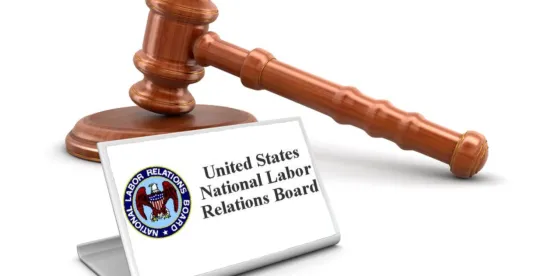NLRB: New Acting GC; Former Member Challenges Removal. There is a lot going on at the National Labor Relations Board (NLRB) these days. In fact, the Board may find itself embroiled in a case involving the constitutional powers of the presidency. Again.
- General Counsel Musical Chairs. President Donald Trump removed Jessica Rutter from her position as acting general counsel at the Board and replaced her with William B. Cowen, who has served as regional director in the Board’s Los Angeles Regional Office (Region 21) since 2016. Cowen has held various positions at the Board over the years, including a stint as a Board member in 2002.
- Former Member Wilcox Challenges Her Removal. Former NLRB member Gwynne Wilcox has filed a lawsuit challenging her removal from the Board. Wilcox claims that her termination was unlawful, as the National Labor Relations Act allows the president to remove Board members only “upon notice and hearing, for neglect of duty or malfeasance in office, but for no other cause.” Wilcox claims that she was never provided a hearing and that the email she received notifying her of her removal failed to identify any neglect of duty or malfeasance. Wilcox seeks a court order reinstating her to her position on the Board. The lawsuit likely sets up a protracted legal challenge testing the president’s constitutional power to remove officials from multimember boards and commissions, such as the NLRB and the U.S. Equal Employment Opportunity Commission (EEOC).
- Board Operations Update. As the Buzz noted last week, with only Chair Marvin Kaplan and Member David Prouty remaining, the Board lacks an operating quorum. To address stakeholder concerns about the situation, the Board released a statement noting that field offices “will continue their normal operations of processing unfair labor practice cases and representation cases” and that “all representation cases may continue to be processed.”
EEOC Update. The EEOC still lacks a quorum and a Senate-confirmed general counsel, but there is now some clarity.
- After removing EEOC General Counsel Karla Gilbride, President Trump appointed Andrew Rogers as acting general counsel. Rogers previously served as EEOC Chair Andrea Lucas’s chief counsel. As such, there is likely to be substantial alignment between the general counsel’s office—which oversees the enforcement at the EECO—and the commissioner’s office.
- Like the NLRB, the Commission lacks a quorum (only Chair Andrea Lucas and Commissioner Kalpana Kotagal remain), which places limitations on its policy-making agenda. Accordingly, this week the Commission released a series of frequently asked questions (FAQs) addressing “The State of the EEOC.” The FAQs note, “The lack of a quorum of Commissioners does not impact the intake, processing, investigation, or resolution of charges of discrimination, nor does it impact the issuance of notices of right to sue.” On the other hand, the FAQs are clear that the lack of a quorum prohibits the Commission from engaging in rulemaking, issuing new policies, or rescinding guidance documents.
DHS Terminates TPS for Venezuela. On February 5, 2025, Secretary of Homeland Security Kristi Noem published a notice in the Federal Register that terminates the October 3, 2023, designation of Venezuela for Temporary Protected Status (TPS), effective April 7, 2025. A second group of Venezuelan nationals who have protection through a separate TPS designation that expires on September 10, 2025, are not affected by this action. Federal law provides that there is no judicial review of “any determination of the [Secretary] with respect to the designation, or termination or extension of a designation, of a foreign state” for TPS.
Anti-DEI Bill Introduced. This week, Senator Eric Schmitt (R-MO) and Representative Michael Cloud (R-TX) reintroduced the Dismantle DEI Act. In many ways, the bill mirrors some of the executive actions we have seen President Trump take with regard to diversity, equity, and inclusion (DEI). For example, the bill would eliminate DEI offices, training, grants, and programs within the federal government. Unlike the executive orders, which can be repealed, the bill would codify these provisions into federal law. The bill would also prohibit the federal government from contracting with entities that engage in “a prohibited diversity, equity or inclusion practice.” The bill could serve as the subject for hearings and press conferences on Capitol Hill, but is unlikely to pass the U.S. Senate as long as the legislative filibuster is intact.
From the Super Bowl to Capitol Hill. Like many Americans, our federal lawmakers will tune in to watch the Super Bowl this Sunday. But having played in a Super Bowl forty-four years ago, Representative Burgess Owens (R-UT) probably has a particular interest in the big game. These days, Congressman Owens serves on the House Committee on Education and the Workforce, and the Buzz has discussed his proposed legislation that would require increased transparency from union salts. But on January 25, 1981, the future Utah lawmaker—who spent ten seasons playing professional football—won Super Bowl XV as a member of the Oakland Raiders. Of course, the MVP of that Super Bowl was Raider quarterback Jim Plunkett, who threw three touchdown passes.




 />i
/>i

